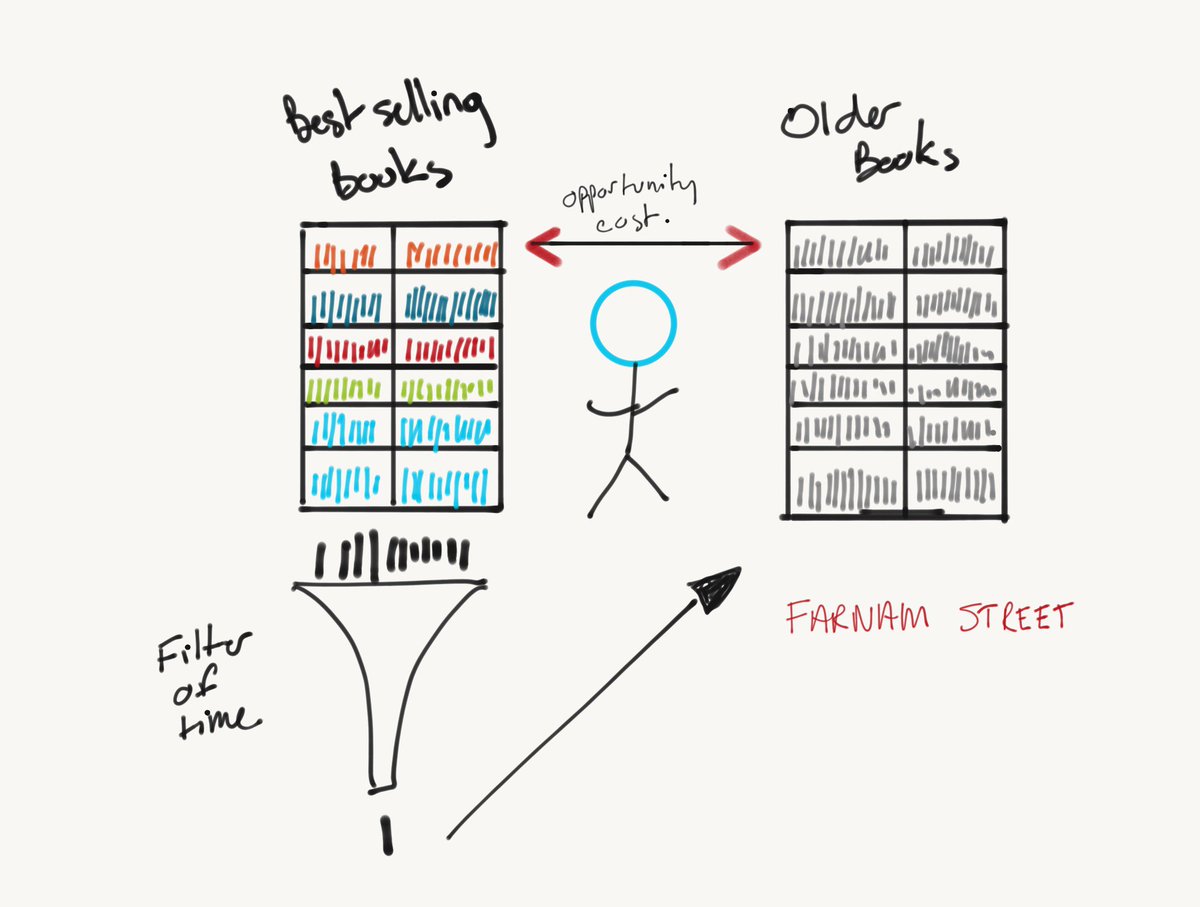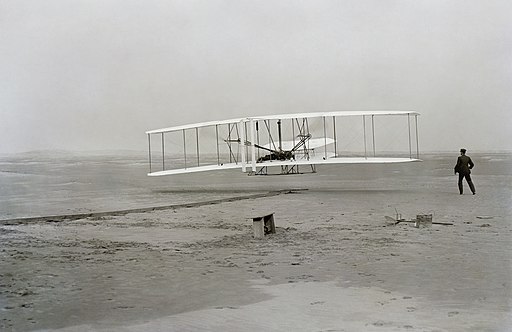Before the good stuff, a quick paradox. This blog exists because there were good ideas in podcasts which should be shared in a more permanent, referenced, and connected manner. So I created this site.
But, podcasts are ephemeral and part of a zeitgeist. They are parts promotion and education. Podcasts have an imbalance of signal and noise, and we don’t know what parts are what.
How do we distill the nowness from the knowledge?
Nassim Taleb solves the paradox this way:
“The best filtering heuristic, therefore, consists in taking into account the age of books and scientific papers. Books that are one year old are usually not worth reading (a very low probability of having the qualities for “surviving”), no matter the hype and how “earth-shattering” they may seem to be.
Farnam Street, one of my favorite blogs, summarized it visually:

My conclusion is this: even though podcasts are of the moment, the connections are not. Each additional person that keeps a low overhead, knows that good things take time, and sees danger in safety adds a pillar to the library we call truth.
History though, remains fertile, and it’s Wilbur and Orville Wright who we can look at now. One hundred years may separate us, but if things work now, as it did then, we should figure out what those things were. Like Grandma’s famous spaghetti and meatball recipe, to survive the test of time, it has to be good.
Each factoid below is from David McCullough’s book, The Wright Brothers.
1/ The Wright brothers valued a low overhead. They had two older brothers and saw the financial challenges each faced. Wilbur and Orville needed to explore the world.
Low overhead is a means of survival. In my book – 28 Lessons from Start-Ups that Failed one of the main causes of death was too high an overhead. This meant hiring too quickly, too much inventory, or expensive marketing. Each commitment a start-up made was an obligation. Each obligation a nail in their coffin.
The Wright brothers avoided this.
Instead, they took the path similar to that of comedians like Jerry Seinfeld, Jay Leno, and Sarah Silverman. Profiled in the book Sick in the Head, each said that they maintained minimalist lifestyles so they could maximize their career. The Wrights did this too.
They didn’t marry. They lived with their sister and father. They expanded slowly. Wilbur and Orville required very little, and only added to their plane what they earned from the bicycle shop.
2/ The Wright brothers undervalued school but elevated education. McCullough writes that their father would let them stay home from school if they were reading something and didn’t want to stop. They were voracious learners.
People can succeed in school or out. The key isn’t school, the key is to learn. Charlie Munger is described as “a book with legs sticking out.” Tim Ferriss created his own business school by investing. Ezra Klein did it for journalism school. The brothers were early enrollees in the XMBA.
The Wright brothers had the chance to go deep in any direction they wanted. Besides two sets of encyclopedias, the brothers had many books, and a father that encouraged reading widely. They never went to college, but you wouldn’t say they weren’t learned men.
3/ The Wright brothers had good timing. Every event is a composite of the events before it. The turn of the century invention of airplanes was no exception. When Wilbur got sick, staying inside for years, Wilbur read to him. All kinds of books, but what struck him most were the books about birds and flight. The invention of dry plated cameras meant there were pictures too.
This primordial soup was one of ideas, specifically about flight. Timing like this matters.
Seth Godin and Mark Cuban both said their timing was good when they got out of the stock market before the dot-com crash. Daymond John (retail, fashion) and Howard Marks (bond investments) both had good timing for their careers. Trip Adler tried to launch on-demand ride sharing too early. Neil Strauss launched his book tour the same weekend as Hurricane Katrina.
The Wrights had good timing. Their invention preceded a world war, and at a time of American growth. They built on the success of others, with information that could be transferred with ease.
Josh Kopelman said there’s no magical dust, good timing is about a little luck and a lot of work. The Wright brothers had both. One observer said of them:
“The Wrights were two of the workingest boys ever seen, and when they worked, they worked. They had their whole heart and soul in what they were doing.”
4/ The Wright brothers didn’t blow up (literally and figuratively). Related to the value of low overhead, you also want to not blow up. You want to survive to fight another day. The Wright brothers did this.
While breathtaking drone footage is common on YouTube, the Wrights had nothing like this. They were careful pioneers. Each brother (they took turns flying, never getting on at the same time in case something happened), tried to minimize the risk of each flight.
Wilbur wrote about this:
“The man who wishes to keep at the problem long enough to really learn anything positively must not take dangerous risks. Carelessness and overconfidence are usually more dangerous than deliberately accepted risks.”
Live to fight another day was a big takeaway from my research on failed startups. Author David McRaney puts it this way: “Success boils down to serially avoiding catastrophic failure while routinely absorbing manageable damage.”
5/ The Wright brothers loved the grind. Besides being, “two of the workingest boys ever seen,” the Wright brothers loved work.
It wasn’t easy to build the world’s first airplane. Clouds of mosquitoes chased them at Kitty Hawk. Busted fliers arrived in France. Broken motors, fanciful press. The only thing missing was that they never trended on Twitter.
When things were bad, they were bad. Riding back to Dayton after a failed fall at Kitty Hawk, it seemed like they could (they would) give up. But, McCullough writes, “the pall of discouragement disappeared in a matter of days, replaced with a surge of characteristic resolve. They would make a fresh start.” Wilbur wrote that despite all these setbacks, “it was the happiest time we’d ever known.”
Another flyer, Chris Hadfield loved the grind too.
“It’s probably not going to happen, but I should do things that keep me moving in the right direction just in case – and I should be sure those things interest me, so that whatever happens I’m happy.”
This is the only way it happens. No one knows something big is happening as it’s happening. James Manos didn’t realize that as he wrote College for The Sopranos, that it would be one of the greatest episodes ever. James Corden didn’t know Gavin and Stacey would be huge. Chamath Palihapitiya didn’t know it about Facebook.
You can aim for big things, but you have to love the work.(a)
6/ The Wright brothers argued. It wasn’t uncommon, McCullough writes, for a day of work to end with an argument. Wilbur and Orville would retire and “sleep on it.” The next day Wilbur would arrive at the workshop and tell Orville that he might be the one who was correct, and Orville would do the same. They argued in pursuit of truths.
One observer said Wilbur, “was always ready to oppose an idea expressed by anybody…ready to jump into an argument with both sleeves rolled up.”
Wright defended this tact, noting, “a good scrap….brought out new ways of looking at things…it helped round the corners.” And Wright, was right.
Part of how to be a genius is to have good arguments. You must test the mettle of your theories. Bill Simmons argues to make better predictions. Brian Koppelman argues to make a better story. Bob Seawright argues to make better choices.
Thanks for reading, I’m @mikedariano on Twitter.
(a) This is chapter 4 of Charles Duhigg’s new book: Smarter, Faster, Better.

[…] Lessons learned from the Wright Brothers. (thewaiterspad) […]
LikeLike
This article is really good. The life history of Wright brothers and inspiration quotes from this article helps everyone to focus on their goal. It contains many important underlying points that inspire the future generation people.
LikeLike
[…] Wilbur Wright said friend of the family George Spratt “was always ready to oppose an idea expressed by anybody…ready to jump into an argument with both sleeves rolled up.” […]
LikeLike
[…] blog began with podcast notes, but I’ve been on a real history kick (Wright brothers, Napoleon Bonaparte ) and we’ll continue with Charles Lindbergh. But, first Philip Tetlock […]
LikeLike
[…] Parish created Farnam Street as a sort of XMBA. Tim Ferriss did it via investing. The Wright brothers often skipped school to focus on learning whatever interested them at the […]
LikeLike
[…] Wright brothers had to have good weather, their materials shipped in one piece, their calculations […]
LikeLike
[…] term I got from Geography of Genius, another book that promotes constructive confrontation. Wilbur Wright was a flyter too, “(Wilbur) was always ready to oppose an idea expressed by anybody…ready to […]
LikeLike
[…] family friend of the Wright brothers noted that they were “two of the workingest boys around.” When times were good, and […]
LikeLike
[…] Wright brothers never married. They lived at home where their sister (and then hired help) kept things up. Robert […]
LikeLike
[…] pushback from assistant coach Bill Paladino. Ben Horowitz gets pushback from Marc Andreessen. The Wright brothers got pushback from each […]
LikeLike
[…] way to build good condition is having books around. From Elizabeth Gilbert to the Wright brothers, people praise the availability of […]
LikeLike
[…] the other hand, Milton Hershey and the Wright brothers never had children. The pace without children is different from the pace with […]
LikeLike
[…] arguments “help round the corners,” said Wilbur Wright. Geniuses argue […]
LikeLike
[…] https://thewaiterspad.com/2016/04/01/wilbur-and-orville-wright/ […]
LikeLike
[…] have one foot in the old and one in the new. Milton Hershey moved from caramel to chocolate. The Wright brothers were inventors who dabbled in aviation, not aviators who invented. Phil Knight was an […]
LikeLike
[…] says that he “trashes the shit” out of ideas that his partner Ben Horowitz brings in. Wilbur Wright “was always ready for a scrap.” Charley Ellis said that David Swenson has succeeded […]
LikeLike
[…] Wilbur Wright wrote, “The man who wishes to keep at the problem long enough to really learn anything positively must not take dangerous risks. Carelessness and overconfidence are usually more dangerous than deliberately accepted risks.” […]
LikeLike
[…] That might be wrong. Athletes, teams, inventors all need chances to win. More chances more winning. Willbur Wright wrote about […]
LikeLike
[…] Ezra Klein, Yvon Chouinard, or the Wright brothers, Falk didn’t have demands on his time. This was Malcolm Gladwell’s point when he wrote […]
LikeLike